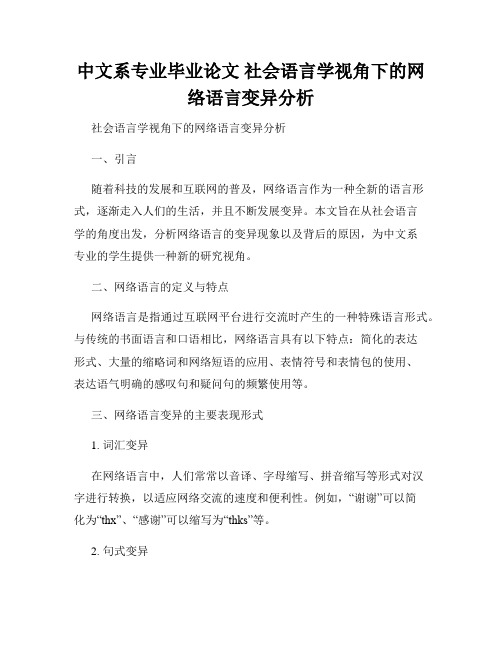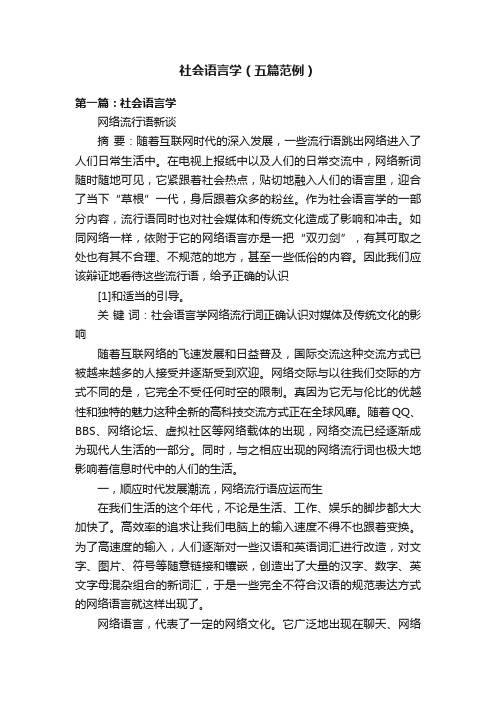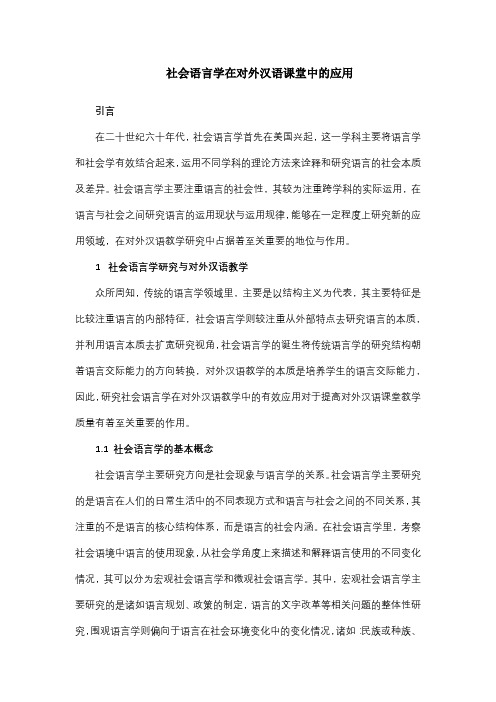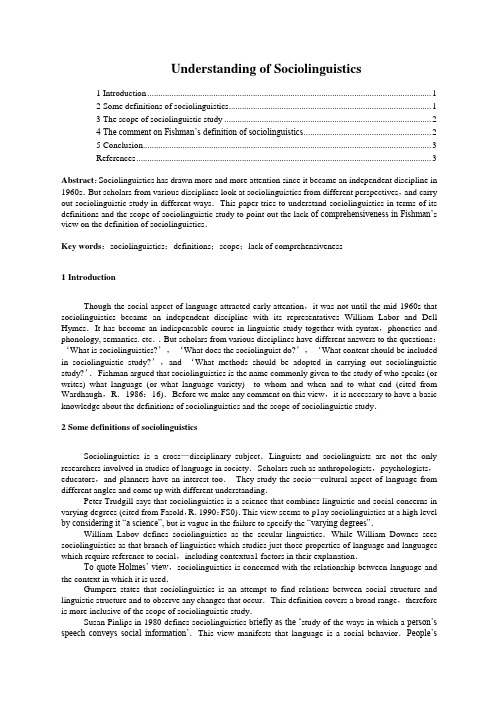社会语言学论文.
中文系专业毕业论文 社会语言学视角下的网络语言变异分析

中文系专业毕业论文社会语言学视角下的网络语言变异分析社会语言学视角下的网络语言变异分析一、引言随着科技的发展和互联网的普及,网络语言作为一种全新的语言形式,逐渐走入人们的生活,并且不断发展变异。
本文旨在从社会语言学的角度出发,分析网络语言的变异现象以及背后的原因,为中文系专业的学生提供一种新的研究视角。
二、网络语言的定义与特点网络语言是指通过互联网平台进行交流时产生的一种特殊语言形式。
与传统的书面语言和口语相比,网络语言具有以下特点:简化的表达形式、大量的缩略词和网络短语的应用、表情符号和表情包的使用、表达语气明确的感叹句和疑问句的频繁使用等。
三、网络语言变异的主要表现形式1. 词汇变异在网络语言中,人们常常以音译、字母缩写、拼音缩写等形式对汉字进行转换,以适应网络交流的速度和便利性。
例如,“谢谢”可以简化为“thx”、“感谢”可以缩写为“thks”等。
2. 句式变异由于网络语言通常以文字表达为主,为了加强语气的表达和注意力的吸引,人们喜欢使用感叹句和疑问句。
同时,句子结构简洁,省略了许多传统书面语言中必备的词语,例如“我很开心”可以表达为“好开心哦!”等。
3. 表情符号和表情包的应用表情符号和表情包是网络语言中非常重要的元素,它们能够传达丰富的情感和信息。
例如,“哈哈哈”可以使用“ ”、“生气”可以用“ ”等。
四、网络语言变异的原因分析1. 快速高效的交流需求网络语言的产生和发展与网络通信的速度和便利性密切相关。
为了更快速地交流信息,人们倾向于简化表达方式和使用缩略词、表情符号等,以减少输入的时间和努力。
2. 群体归属感与身份认同网络语言作为一种新兴的交流方式,具有鲜明的独特性和个性化。
使用特定的网络语言可以让人们感到归属于某个特定的社群或群体,从而塑造自己的身份认同。
3. 跨地域文化交流的需要网络语言的大量使用使得地域文化差异减小,不同地域和文化背景的人们能够更容易地进行交流和理解。
为应对这种跨地域文化交流的需求,网络语言变异成为一种相对中性和易于理解的交流方式。
社会语言学下的语言景观研究论文五篇范文

社会语言学下的语言景观研究论文五篇范文第一篇:社会语言学下的语言景观研究论文摘要:本文介绍了全球化社会语言学及其核心概念——超多元性、移动性和标准性,并用这些核心概念对语言景观中存在的不规范现象进行了解释。
自上世纪末以来,国际上的语言景观已发展成社会语言学中一个热门的研究领域。
本文在已有基础上,着重考察语言景观研究的认识论基础、分析维度以及理论构建情况,进一步阐述这一语言学前沿学科的研究动态。
关键词:全球化社会语言学;语言景观;语言标牌全球化是一种社会现象,在全世界经济、政治、技术、文化整合的综合过程中,语言现象也比以往任何时候都更加复杂和多元。
而“全球化社会语言学”正是为了研究这种新现象而出现的新理论。
语言景观是指某个特定的国家里语言情况的描述与分析,也可以指某一个更大的地理区域内的语言现象和语言使用情况。
一、语言景观研究的概念现实环境中用以陈列展示语言文字物质载体称作语言标牌。
在社会语言学中,对公共语言标牌上语言使用的研究称作“语言景观”研究。
在这些为公众所共享的空间中,标牌语言所构建的语言景观并不是简单的语言陈列或呈现,其背后往往蕴含着一定的创设机制和思想意识。
其实,随着该领域研究的深入,研究范围已从公共空间延伸到室内场所及虚拟空间等。
二、语言景观研究的多维视角语言景观研究可以从很多视角或维度入手,但从已取得的成果来看,其研究重点主要集中在以下一些主题上。
(一)多语言的使用。
Gorter把语言景观看作是研究多语言使用一种新路径,语言景观研究中最多的成果也出现在这一方面。
在多语言使用研究的主要成果中,Ben-Rafael等对以色列的犹太人社区、巴勒斯坦人社区、东耶路撒冷的非以色列——巴勒斯坦人社区的希伯来语、阿拉伯语和英语语言景观的模式进行了调查分析。
他们的研究结果表明,不同族群社区的语言使用具有不同的语言景观模式。
(二)语言政策的实施。
语言景观实际上就是语言政策实施情况的具体体现。
任何一个国家的官方语言政策都会规定在公共空间使用什么样的语言。
社会语言学(五篇范例)

社会语言学(五篇范例)第一篇:社会语言学网络流行语新谈摘要:随着互联网时代的深入发展,一些流行语跳出网络进入了人们日常生活中。
在电视上报纸中以及人们的日常交流中,网络新词随时随地可见,它紧跟着社会热点,贴切地融入人们的语言里,迎合了当下“草根”一代,身后跟着众多的粉丝。
作为社会语言学的一部分内容,流行语同时也对社会媒体和传统文化造成了影响和冲击。
如同网络一样,依附于它的网络语言亦是一把“双刃剑”,有其可取之处也有其不合理、不规范的地方,甚至一些低俗的内容。
因此我们应该辩证地看待这些流行语,给予正确的认识[1]和适当的引导。
关键词:社会语言学网络流行词正确认识对媒体及传统文化的影响随着互联网络的飞速发展和日益普及,国际交流这种交流方式已被越来越多的人接受并逐渐受到欢迎。
网络交际与以往我们交际的方式不同的是,它完全不受任何时空的限制。
真因为它无与伦比的优越性和独特的魅力这种全新的高科技交流方式正在全球风靡。
随着QQ、BBS、网络论坛、虚拟社区等网络载体的出现,网络交流已经逐渐成为现代人生活的一部分。
同时,与之相应出现的网络流行词也极大地影响着信息时代中的人们的生活。
一,顺应时代发展潮流,网络流行语应运而生在我们生活的这个年代,不论是生活、工作、娱乐的脚步都大大加快了。
高效率的追求让我们电脑上的输入速度不得不也跟着变换。
为了高速度的输入,人们逐渐对一些汉语和英语词汇进行改造,对文字、图片、符号等随意链接和镶嵌,创造出了大量的汉字、数字、英文字母混杂组合的新词汇,于是一些完全不符合汉语的规范表达方式的网络语言就这样出现了。
网络语言,代表了一定的网络文化。
它广泛地出现在聊天、网络论坛等各种因特网应用场合,并渗透到现实生活中,对人们的生活产生了一定影响,它来源及其广泛,大多取材于方言俗语、各门外语、缩略语、谐音、误植,甚至以符号合并以达到形象效果等等。
属于混合语言,通常使用注意文字或俗称的“火星文”,而且又由于语言及文化的不同,形成了各种不同的、有地方特色的因特网语言。
社会语言学论文

Viewing the Movie My Fair Lady from SociolinguisticPerspectiveby寇佳艳School of TourismXi'an International Studies UniversityXi’an, China2010Viewing the Movie My Fair Lady from Sociolinguistic PerspectiveAbstractMy Fair Lady is a classic movie, which has already been appreciated too much from the viewpoint of literature and translation, but few analysis are from linguistic viewpoint. It is also acknowledged that this movie is a good example of sociolinguistics. This paper is to analysis their dialogue in the film from sociolinguistic perspective. To be specific, this paper will discuss several sociolinguistic aspects by analyzing their dialogue and these aspects are language and social class, language and gender and language planning.摘要《窈窕淑女》是一部经典电影,许多学者已经从文学和翻译学角度对这部电影做了赏析,但很少有评析是以社会语言学角度出发的。
这部电影也是有关社会语言学一个很好的教材。
论文——社会语言学在对外汉语课堂中的应用

社会语言学在对外汉语课堂中的应用
引言
在二十世纪六十年代,社会语言学首先在美国兴起,这一学科主要将语言学和社会学有效结合起来,运用不同学科的理论方法来诠释和研究语言的社会本质及差异。
社会语言学主要注重语言的社会性,其较为注重跨学科的实际运用,在语言与社会之间研究语言的运用现状与运用规律,能够在一定程度上研究新的应用领域,在对外汉语教学研究中占据着至关重要的地位与作用。
1 社会语言学研究与对外汉语教学
众所周知,传统的语言学领域里,主要是以结构主义为代表,其主要特征是比较注重语言的内部特征,社会语言学则较注重从外部特点去研究语言的本质,并利用语言本质去扩宽研究视角,社会语言学的诞生将传统语言学的研究结构朝着语言交际能力的方向转换,对外汉语教学的本质是培养学生的语言交际能力,因此,研究社会语言学在对外汉语教学中的有效应用对于提高对外汉语课堂教学质量有着至关重要的作用。
1.1 社会语言学的基本概念
社会语言学主要研究方向是社会现象与语言学的关系。
社会语言学主要研究的是语言在人们的日常生活中的不同表现方式和语言与社会之间的不同关系,其注重的不是语言的核心结构体系,而是语言的社会内涵。
在社会语言学里,考察社会语境中语言的使用现象,从社会学角度上来描述和解释语言使用的不同变化情况,其可以分为宏观社会语言学和微观社会语言学。
其中,宏观社会语言学主要研究的是诸如语言规划、政策的制定,语言的文字改革等相关问题的整体性研究,围观语言学则偏向于语言在社会环境变化中的变化情况,诸如:民族或种族、。
社会语言学论文关于社会语言学的论文

社会语言学论文关于社会语言学的论文含有动物名称商标的语言特点摘要:含有动物名称的商标,由两部分组成,我们记为“X+动物名称”和“动物名称+X”。
其中“X”是有标记的意合部分,可以直接意会到含有动物名称商标的寓意;动物名称是无标记的意合部分,是象征意义的体现。
动物名称在商标语言中与行业、性别、年龄、职业和地域有关。
把有标记的意合部分和无标记的意合部分结合起来分析,可以领会含有动物名称商标的整体含义。
关键词:动物名称意合部分商标社会语言学一、引言随着市场经济的繁荣发展,商品的种类也逐渐丰富,相应地,商品与商品间的区别也越来越重要,商标的作用就越来越突显。
在众多的商标中,不仅有文字商标,还有图案商标;不仅有以地名、人名或企业产品等方式命名的,而且作者众多以动物名称命名的。
比如2007年的中国名牌产品中含有动物名称的商标占9.11%;2009年的中国驰名商标中含有动物名称的商标占6.5%。
可见,含有动物名称的商标占有相当可观的比例(人名和地名在2007年中国名牌和2009年中国驰名商标中的比例在3%以下)。
在2007年的中国名牌产品和2009年的中国驰名商标中,含有动物名称的很多,比如:龙、凤、鹰、雕、马、鸟、狮、狼、猪、燕、牛、兔、象、鹭、猴、猫、鱼、鹏、蝶、蜻蜓、羊、鹤、蜂、天鹅、驼、虎、雁、龙虾等。
除了中国名牌产品和中国驰名商标以外,还有许多商标中含有动物名称,这些商标的动物名称涉及动物的种类更多,涉及的行业更广。
通过观察含有动物名称的商标,我们可以发现这类商标的结构是“X+动物名称”或“动物名称+X”。
对于“X”,我们可以对其字词以及结构作一些描写;对动物名称作社会语言学分析,可以发现商家在取名时的匠心独运。
为了集中体现动物名称在商标中的语言特点,我们排除了图形商标,只选择文字商标作为论述的对象。
面对众多行业的商标,我们选择与生活密切相关的、动物名称较多的行业来作解析的例子,这些行业包括服饰、交通工具、食品、烟酒、首饰珠宝、日化用品、电器、装饰材料等。
社会语言学论文关于社会语言学的论文

社会语言学论文关于社会语言学的论文含有动物名称商标的语言特点摘要:含有动物名称的商标,由两部分组成,我们记为“X+动物名称”和“动物名称+X”。
其中“X”是有标记的意合部分,可以直接意会到含有动物名称商标的寓意;动物名称是无标记的意合部分,是象征意义的体现。
动物名称在商标语言中与行业、性别、年龄、职业和地域有关。
把有标记的意合部分和无标记的意合部分结合起来分析,可以领会含有动物名称商标的整体含义。
关键词:动物名称意合部分商标社会语言学一、引言随着市场经济的繁荣发展,商品的种类也逐渐丰富,相应地,商品与商品间的区别也越来越重要,商标的作用就越来越突显。
在众多的商标中,不仅有文字商标,还有图案商标;不仅有以地名、人名或企业产品等方式命名的,而且作者众多以动物名称命名的。
比如2007年的中国名牌产品中含有动物名称的商标占9.11%;2009年的中国驰名商标中含有动物名称的商标占6.5%。
可见,含有动物名称的商标占有相当可观的比例(人名和地名在2007年中国名牌和2009年中国驰名商标中的比例在3%以下)。
在2007年的中国名牌产品和2009年的中国驰名商标中,含有动物名称的很多,比如:龙、凤、鹰、雕、马、鸟、狮、狼、猪、燕、牛、兔、象、鹭、猴、猫、鱼、鹏、蝶、蜻蜓、羊、鹤、蜂、天鹅、驼、虎、雁、龙虾等。
除了中国名牌产品和中国驰名商标以外,还有许多商标中含有动物名称,这些商标的动物名称涉及动物的种类更多,涉及的行业更广。
通过观察含有动物名称的商标,我们可以发现这类商标的结构是“X+动物名称”或“动物名称+X”。
对于“X”,我们可以对其字词以及结构作一些描写;对动物名称作社会语言学分析,可以发现商家在取名时的匠心独运。
为了集中体现动物名称在商标中的语言特点,我们排除了图形商标,只选择文字商标作为论述的对象。
面对众多行业的商标,我们选择与生活密切相关的、动物名称较多的行业来作解析的例子,这些行业包括服饰、交通工具、食品、烟酒、首饰珠宝、日化用品、电器、装饰材料等。
社会语言学论文(基础)Understanding of Sociolinguistics

Understanding of Sociolinguistics1 Introduction (1)2 Some definitions of sociolinguistics (1)3 The scope of sociolinguistic study (2)4 The comment on Fishman’s definition of sociolinguistics (2)5 Conclusion (3)References (3)Abstract:Sociolinguistics has drawn more and more attention since it became an independent discipline in 1960s.But scholars from various disciplines look at sociolinguistics from different perspectives,and carry out sociolinguistic study in different ways.This paper tries to understand sociolinguistics in terms of its definitions and the scope of sociolinguistic study to point out the lack of comprehensiveness in Fishman’s view on the definition of sociolinguistics.Key words:sociolinguistics;definitions;scope;lack of comprehensiveness1 IntroductionThough the social aspect of language attracted early attention,it was not until the mid 1960s that sociolinguistics became an independent discipline with its representatives William Labor and Dell Hymes.It has become an indispensable course in linguistic study together with syntax,phonetics and phonology, semantics. etc..But scholars from various disciplines have different answers to the questions:‘What is sociolinguistics?’,‘What does the sociolinguist do?’,‘What content should be included in sociolinguistic study?’,and ‘What methods should be adopted in carrying out sociolinguistic study?’.Fishman argued that sociolinguistics is the name commonly given to the study of who speaks (or writes) what language (or what language variety) to whom and when and to what end (cited from Wardhaugh,R.1986:16).Before we make any comment on this view,it is necessary to have a basic knowledge about the definitions of sociolinguistics and the scope of sociolinguistic study.2 Some definitions of sociolinguisticsSociolinguistics is a cross—disciplinary subject.Linguists and sociolinguists are not the only researchers involved in studies of language in society.Scholars such as anthropologists,psychologists,educators,and planners have an interest too.They study the socio—cultural aspect of language from different angles and come up with different understanding.Peter Trudgill says that sociolinguistics is a science that combines linguistic and social concerns in varying degrees (cited from Fasold,R.1990:FS0).This view seems to p1ay sociolinguistics at a high level by considering it “a science”, but is vague in the failure to specify the “varying degrees”.William Labov defines sociolinguistics as the secular linguistics.While William Downes sees sociolinguistics as that branch of linguistics which studies just those properties of language and languages which require reference to social,including contextua1 factors in their explanation.To quote Holmes’ view,sociolinguistics is concerned with the relationship between language and the context in which it is used.Gumperz states that sociolinguistics is an attempt to find relations between social structure and linguistic structure and to observe any changes that occur.This definition covers a broad range,therefore is more inclusive of the scope of sociolinguistic study.Susan Pinlips in 1980 defines sociolinguistics b riefly as the ‘study of the ways in which a person’s speech conveys social information’.This view manifests that language is a social behavior.People’sdifferent choices of linguistic forms may reflect their different social background.Wolfson expresses his view by saying that sociolinguistics is the study of the interplay of linguistic,social,and cultural factors in human communication.In Longman Dictionary of Language Teaching &Applied Linguistics, sociolinguistics is defined as the study of language in relation to social factors, that is, social class,educational level and type of education, Age, sex,ethnic origins,etc.(Richard,J.C.1992:425).It seems that there is no agreement on the exact definition of sociolinguistics,just like what Dell Hymes has claimed:“Different people may have different understanding of the term ‘sociolinguistics’.Therefore,no one has the patent for its definition.”(cited in Fasold.1990:F 12) But however different views scholars hold,they are ready to agree at least one point.That is,sociolinguistics studies the relation between language and society.Whatever sociolinguistics is,it must be oriented toward both data and theory.But still scholars will come up with different answers to the question ‘What content should be included in sociolinguistic study?’.3 The scope of sociolinguistic studyWe can generally divide sociolinguistic study into the broad sense and the narrow sense.The former is also widely called the macro-sociolinguistics,and the latter micro-sociolinguistics.To make the division clear, Wolfson compared sociolinguistic study to a sort of telescope through which language behavior may be studied in its socio-cultural context.In looking through the small end of the telescope,we view speech at the level of face-to-face interaction,and this type of study is called micro-sociolinguistics.By looking through the large end of the sociolinguistic telescope,we are able to see the workings of language contact,choice,use,maintenance,and change at the social level,a field of study called the sociology of language or macro-sociolinguistics.Hudson in 1980 made a distinction between sociolinguistics and the sociology of language in stating that the former is the study of language in relation to society while the later is the study of society in relation to language(cited in Wardhaugh,R.1986:12-13). That is to say.sociolinguistics can be studied either from the perspective of language or from that of society.Hudson further argues that the influence which society exerts on language is the major concern of sociolinguistic study.Some scholars also classify sociolinguistic study into the theoretical research model and the practical research mode1.But no matter how scholars define and understand sociolinguistics,it is generally agreed that sociolinguistic study mainly deals with social variation, language varieties,the differences of language use conventions,and the socio-cultural factors that contribute to the variation, varieties and differences.Social variation in language including the variation of region,social class, register, style,age and sex has been one of the major focuses of sociolinguistics since its formation in the early 1960.Language variety has been and still is the main concern of sociolinguistics,but the scope of sociolinguistic study may be very wide such that it can cover almost everything.Sociolinguistics is an empirical science.it must be founded on an adequate data base.This requires that when we are considering sociolinguistics,we should take the various kinds of research methods Into account.It is better to collect data through observing naturally occurring linguistic events.The ethnomethodology makes one significant contribution to the development of sociolinguistic study.4 The comment on Fishman’s definition of so ciolinguisticsFishman says that sociolinguistics is the name commonly given to the study of who speaks(or writes)what language (or what language variety)to whom and when and to what end.The American sociolinguist Nessa Wolfson shares the similar view with Fishman in generalizing the scope of sociolinguistics to be‘Who says what to whom,when and how’(cited from Hudson.1980:F14).Brief as Fishman’s definition is,it includes the major elements in sociolinguistics:“what” representsthe language or language variety.“who”, “whom”, “when”and “to what end”represent those social variables.This may be better understood by considering the four components that influence linguistic choices,namely,the participants,the setting or social context of the interaction.the topic and the function(Holmes,Janet.1997:12).Hymes’s SPEAKING theory may also be adopted to account for Fishman’s definition to some extent.In spite of its brevity and reasonableness,this definition is not comprehensive enough to inform us the nature of sociolinguistics,the relationship between it and the sociology of language or other disciplines.Neither does it cover the broad range of the scope of sociolinguistic study.It looks at sociolinguistics from the viewpoint of interpersonal interactions,and covers social variation and language variety, thus belongs to the scope of micro-sociolinguistics.To mention only the language variety does not make the whole story.It also fails to mention the research methods and the theoretical base of sociolinguistic study.Therefore,Fishman’s definition can not provide us with an overall and thorough understanding of sociolinguistics.5 ConclusionThough scholars from various disciplines have shown great interest in the socio—cultural aspect of language,different researchers define sociolinguistics differently and come up with different understanding.In fact,sociolinguistic study is characterized by a wide variety or inclusiveness of its research scope.Cf.McGregor argues that as long as we are fully aware of this point,questions like “How to define sociolinguist ics?” and “What content should be included in sociolinguistic study?” seem to be not very imperative and important(quoted in Fasold,R.1990:F12).References1, Downes, William,1998.Language and Society【M】.2nd edition.Cambridge:CUP.2, Fasold,R.1 990 The Sociolinguistics【M】.Oxford:Blackwell Publishers Ltd.3, Holmes.Janet.I 997.An Introduction to Sociolinguistics【M】.New York:Longman Ltd.4, Hudson,R.A.1 980.Sociolinguistics【M】.2-edition.Cambridge:CUP.5, Richards,C.J.and Platt,J.and Platt,H.1 992.Longman Dictionary of Language Teaching&Applied Linguistics【M】.New York:Longman Ltd.6, Salzmann,Zdenek.1993.Language.Culture.& Social An Introduction to Linguistic Anthropology 【M】.Boulder:Westview Press,Inc.7, Trask,R.L.I999.Key Concepts in Language and Linguistics【M】.London;Routledge.8, Wardhaugh.R.1986.An Introduction to Sociolinguistics:Issues of Society and Schooling 【M】.Oxford:Basil Blackwel1.9, Wardhaugh.R.1998.An Introduction to Sociolinguistics【M】.3 edition.Oxford:Blackwel1.10, Wolfson,N.1989.Perspectives.Sociolinguistics and TESOL【M】.Cambridge:Newbury.。
- 1、下载文档前请自行甄别文档内容的完整性,平台不提供额外的编辑、内容补充、找答案等附加服务。
- 2、"仅部分预览"的文档,不可在线预览部分如存在完整性等问题,可反馈申请退款(可完整预览的文档不适用该条件!)。
- 3、如文档侵犯您的权益,请联系客服反馈,我们会尽快为您处理(人工客服工作时间:9:00-18:30)。
从社会语言学角度分析美国俚语一.Definitions of slangs二.Characteristics of American slangs三.Social analysis of slangs from the perspective of gender, age, occupation and social settings to use slang四.Social functions of slang五.Social reasons for the use of slang1.IntroductionTo study slang scientifically,we can take the anthropological tradition of cultural relativism.“According to Bryjak and Soroka(1994:57),‘cultural relativism is the belief that there is no universal standard of good and bad or right and wrong and that an aspect of any given culture can be judged only within its own context.’Cultural relativists appear to suggest that all cultures or institutions are equally valid or fitting and tend to assume that the mere presence of a cultural trait warrants our valuing it”(Lin Dajing,1997).俚语作为语言的一种,引起特殊性发挥着自己独特的作用,然而很多人并未对俚语有正确的认识,很多人把俚语作为地俗语对待,笔者认为,语言作为一种社会现象,尤其存在的合理性,从社会语言学的角度讲,任何语言种类都是平等的,没有层级之分。
本文将从社会语言学的角度对俚语这一语言特殊现象做一粗浅分析,希望能是大家改变对俚语的歧视态度。
俚语常被定义为粗俗的语言,这种语言有其特定的使用群体,虽然使用者大多为知识水平不高的人群,但不能因此就对此语言有贬低,正是基于此观点,本文进行了如下分析。
2.Definition of slang2.1 definitionsDuring the history of language development, people’s attitudes toward slang have changed a lot. In 1828 Webster defined it as “low,vulgar, unmeaning language.” Slang is very informal language that includes new and something not polite words and meanings and is often used among particular groups of people, and is usually not used in serious speech or wring (Longman dictionary of English Language and Culture 2004). Oxford Advanced Learner’s English-Chinese Dictionary defines slang as “very informal words, phrases, etc commonly used in speech, esp between people from the same social group or who work together, not considered suitable for formal contexts and often not in use for long.”From these three definitions, we can see that in the past slang suffered abuse from people and nowadays this discrimination has disappeared and is regarded as informal and highly colloquial language.2.2attitudesSlang is acknowledged to be one of the most active and sensitive parts of language and an effective weapon in communication. However, theattitudes toward slang are very contradictory among common people and especially scholars. This can be detected from the above three definitions of slang.(qtd.in Partridge 1954:7,3) can also reflects the contradiction of people’s opinions:“The language of slang is the conversation of fools. Men of discretion will not pervert language to the unprofitable purposes of conversational mimicry…The friends of literature will never adopt it,as it is actively opposed to pure and grammatical diction” and “it is impossible to acquire a thorough knowledge of English [or of any other language, for that matter] without being familiar with slang and vulgarism. Whoever is uninitiated…will be at a loss to understand many of the masterpieces of English literature. Nay…he will scarcely be able even to understand an English newspaper.” These remarks remarks sum up the paradox of slang very well: “Slang is the foe and the friend of the English language”(qtd.in Partridge 1954:21).2.3sociallinguistic approach to slangas we have mentioned, slang a important component of language, and as language, it, in itself, can not be evaluated as right or wrong. It is just a social phenomenon reflected in language, so we should take an objective attitude to analyze it. This paper will do it from the perspective of sociolinguistics, because sociolinguistics is that part of linguistics which is concerned with language as a social and culturalphenomenon”(Trudgill:1983). Therefore, the study of language can not be separated from society and culture.2.4Characteristics of slangAmerican slang, as the product of American society, has its distinctive characteristics. According to 硕士论文,there are four distinct features which is rooted in American society, that is its brevity, novelty, instability and plural synonym.2.4.1BrevityJust as Flexner(1975) remarks,brevity may not be the soul of American slang, but it is perhaps the chief feature. The American Dictionary of Slang also demonstrates that slang seems to prefer short words. This is usually attained by the substitution of simple syllables to express the meaning of a longer word or expression. Simp (stupid person), veep (vice president) and classy (fashionable) are brief and easy to speak out. What’s more, some slangs can briefly express the meaning which can not be done by one standard usage such as doodle (scribble absent-mindedly) and frisk (make a body search—especially refers to patting or touching someone’s pockets or places where something can be hidden and carried about).2.4.2 NoveltySlang words are often invented by people for the pleasure of novelty and imitated by others who like to be in fashion. For example, they usethink-machine for brain, sparkler for diamond and flying coffin for plane.2.4.3InstabilityInstability is another distinct feature of slangs. Unlike other kinds of language, slang words usually do not remain for many years, though some slangs change into standard language after some time. Gay, for instance, started its life in the sense “homosexual”in the 1930s, and nowadays is broadly accepted as standard terminology.2.4.4rich synonymsAmerican slang is characteristic of a wealth of synonyms, which has a close connection with the pursuit of novelty. Take money for example, there are such expressions for money as brass, lolly, tin, dough, mazuma, moolah and bread.3.Social analysis of slangs from the perspective of gender, age,occupation and social settings to use slangSlangs are not only different from other kinds of languages in its characteristics but also has specific features in the slang-users. This part will explain this from the perspectives of the users’age, gender and occupation.3.1 genderMost American slang is created and used by males. De Klerk (1990, 1992) also found that the gender difference in use and tolerance of slang was leveling out in contemporary society and that the stereotype of makesbeing the primary slang users was open to question (qtd. In Thomas. C. Cooper. 2001). Many types of slang words ---including the taboo and strongly derogatory ones, those referring to women, work, money, whiskey, politics, transportation, sports and the like---refer primarily to male endeavor and interest. The majority of entries in all slang dictionaries could be labeled “primarily masculine use”(Flexner, 1960: xxiv).3.2 AgeAge also influences the use of slangs. American youths, especially the teenagers and college students, are the main consumers and makers of American slangs. They are not afraid of making mistakes, and full of curiosity. They are always ready to challenge traditional conventions and customs. Therefore, many fashionable slangs are created and wide spread by these young people.3.3 OccupationSlangs also have something to do with one’s occupation. Generally speaking, the higher education required for the occupation, the lower tolerance will be for slang.4.social reasons of slangNiceforo provided the following fifteen reasons for using slang. Slang, he believes, is employed because of one or more of these reasons. ( qtd. in Partridge 1954:6-7):(1) In sheer high spirits, by the young in heart as well as by the young in years; “just for the fun of the thing”; in playfulness or waggishness. (2) As an exercise either in wit and ingenuity or in humor. (The motive behind this is usually self-display or snobbishness, emulation or responsiveness, delight in virtuosity.)(3) To be “different” to be novel.(4) To be picturesque (either positively or--as in the wish to avoid insipidity--negatively).(5) To be unmistakably arresting, even startling.(6) To escape from cliches, or to be brief and concise. (Actuated by impatience with existing terms.)(7) To enrich the language. (This deliberateness is rare save among the well-educated, Cockneys forming the most notable exception; it is literary rather than spontaneous.)(8) To lend an air of solidity, concreteness, to the abstract; of earthiness to the idealistic; of immediacy and appositeness tothe remote.(9) To lessen the sting of, or on the other hand to giveadditional point to, a refusal, a rejection, a recantation. Toreduce, perhaps also to disperse, the solemnity, the pomposity,the excessive seriousness of a conversation. To soften thetragedy, to lighten or to “prettify” the inevitability of death ormadness, or to mask the ugliness or the pity of profoundturpitude (e.g., treachery, ingratitude);and/or thus to enablethe speaker or his auditor or both to endure, to “carry on”.(10)To speak or write down to an inferior, or to amuse asuperior public; or merely to be on a colloquial level with eitherone’s audience or one’s subject matter.(11) For ease of social intercourse.(12) To induce either friendliness or intimacy of a deep or adurable kind.(13) To show that one belongs to a certain school, trade, or profession, artistic or intellectual set, or social class; in brief, tobe “in the swim” or to establish contact.(14) Hence, to show or prove that someone is not “in the swim”.(15) To be secret-not understood by those around one.Of course, lists of functions of slang can not be exhausted. Thereare other aspects arresting and outlandish about slang. But it does not mean that users can apply it to any person on any occasion. Slang islike casual dress, which is only suitable to certain occasions.5.social functions of slangsMain social functions of slangs can be summarized as followed:5.1 for prestige and superiorityFrom the point of view of the slang users, the slang words are not low andvulgar but bring them kind of prestige. Therefore, to some extent, what kind of slangs are used becomes kind of reflection of the user’s cultural values. In daily life, people。
